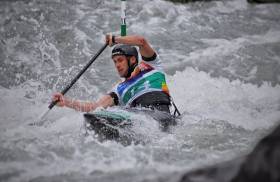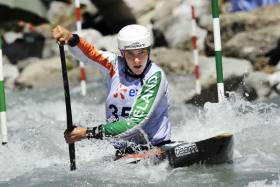Displaying items by tag: Cochrane
Cochrane and Teague Qualify for Semis of World Cup Final
#Canoeing: Jake Cochrane and Eoin Teague made it through to the semi-finals at the canoe slalom World Cup Final in Prague. Teague, in the K1, and Cochrane in the C1, both qualified from their second runs. Liam Jegou did not in the semi-finals of the men’s C1. He came close in the first run and had three touches, incurring six seconds in penalties, in his second.
#Canoeing: Liam Jegou topped the rankings in his first run and qualified directly for the semi-finals at the canoe slalom under-23 World Championships in Krakow in Poland. The Ireland C1 competitor had a fault-free round in 83.55 seconds. Ireland’s two other contenders in this class fell outside the qualificaton mark: Robert Hendrick missed gate 10 and incurred a 50-second penalty in an otherwise steady run. Jake Cochrane touched gates 12 and 14 and then missed gates 17 and 18, to finish 60th. Hendrick finished 15th in his second run and Cochrane 27th.
Canoe Slalom World Championships, Under-23 and Junior, Krakow, Poland (Irish interest; selected results):
Men
Under-23 C1 – First Run (20 qualify directly for semi-finals): 1 Ireland (L Jegou) 83.55 seconds; 54 R Hendrick 141.89; 60 J Cochrane 200.64. Second Run (10 qualify): 15 Hendrick 94.87; 27 Cochrane 100.74.
Junior C1 – First Run (20 qualify): 41 Ireland (E Moorhouse) 120.92; 49 F McNally 164.94. Second Run: 20 McNally 113.71; 34 Moorhouse 162.06.

























































